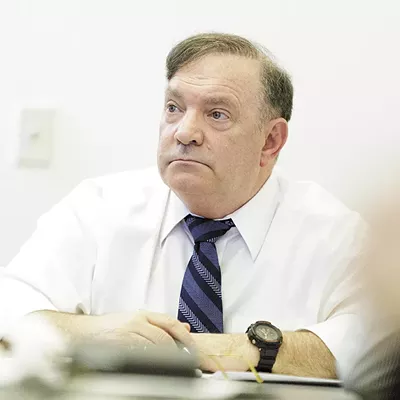In a Dec. 28 column for the New York Times, economist (and recent Nobel Prize winner) Paul Krugman noted that President Herbert Hoover doomed the United States in 1932 by trying to balance the budget during difficult financial times (in this case, the beginning of the Great Depression). He opined that President-elect Barack Obama likely won’t make the same mistake — cutting social assistance programs at a time when people need them most — writing, “The Obama administration will put deficit concerns on hold while it fights the economic crisis.”
But while Obama likely won’t make dangerous cuts, Krugman notes he’ll have to deal with 50 mini-Hoovers in the form of the 50 state governors, nearly all of whom are bound by law to balance their budgets. They may have little choice, but, as Krugman notes, “Let’s step back for a moment and contemplate just how crazy it is, from a national point of view, to be cutting public services and public investment right now.”
That craze will hit Olympia hard starting Monday, as the state’s 105-day legislative session starts as it faces an almost $6 billion budget shortfall — the largest in its history. The biennial process of balancing the state’s books is rarely simple and harmonious. This year, prepare for much wailing and gnashing of teeth.
Governor Chris Gregoire has already made the first move on the state’s financial plan. In December, she released a proposed budget in which she diagnosed Washington’s economic woes, pointing to the ballooning cost of providing services from medical assistance to K-12 education (combined, these two have cost $1.8 billion more than expected in the last two years) and a precipitous drop in money coming in to the state. “The result is an approximately $5.7 billion shortfall for 2009-11,” she writes, “which is a little more than the entire budgets of our higher education institutions and the Department of Corrections combined.”
But Gregoire, whose name was being floated earlier this week as a possible nominee for Commerce secretary in Washington, D.C., is unlikely to shutter the jails and colleges anytime soon. Instead, she has proposed a no-new-taxes budget with tiny to significant cuts across the board, in all the areas the state’s allowed to cut. (Federal law precludes tampering with budgets for basic education and medical assistance, which, with other miscellanea, account for about 60 percent of Washington’s financial picture.)
Gregoire proposes cutting more than 12 percent each from natural resources and health and human services, along with single-digit slashes to higher education, early learning and public safety. That would mean (among many other things) closing residential rehabilitation centers, reducing funding for the state’s Basic Health Plan (for the working poor) by 42 percent, eliminating medical coverage for the “unemployable” (while retaining it for aged, blind and disabled), reducing funding to research and regional colleges and universities by 13 percent, deporting some non-citizen criminals, and closing 13 state parks and some fish hatcheries. It’s a budget, Gregoire glumly wrote in December, in which “there is something for everyone not to like.”
Two groups in particular have been quick to express their dislike. Both the Service Employees International Union and the Washington Federation of State Employees filed lawsuits over the governor’s proposal — specifically, for not including money for the former’s home-care contract and the latter’s salary increases.
But Rep. Timm Ormsby, from Spokane’s 3rd Legislative District, cautions detractors and the press to remember that the governor’s budget is merely a proposal — and a “wild-ass guess” at that. “The governor doesn’t get to write the budget. It’s the Legislature’s responsibility,” he says. “My thought was that she did what she said she was going to do: create a no-new-taxes budget.”
Still, the governor’s proposals (and the funding requests from state agencies) will be on legislators’ minds when they begin work, and the financial factors that Gregoire outlined are the same realities senators and representatives will need to reckon with.
Senator Chris Marr, from Spokane’s 6th Legislative District, says he was surprised that many state agencies got away as easily as they did in the governor’s budget. On the other hand, “[Her] forecast [only] went through October. Automotive sales and retail sales [are way down]. The Boeing strike was not factored into those revenue numbers. I don’t think anyone can not foresee an additional drop. Potentially, we could be looking at another billion dollars, easily,” he says. “We don’t know how deep the hole is … And it would be foolish to think there’s any way to find additional dollars.”
Marr is reluctant to get detailed when talking about the budget. He says Democratic leadership is advising caution to “refrain from advocating one particular approach or dismissing a particular approach out of hand,” he says, noting that he hopes for a bipartisan approach during this session.
Still, he says he’d like to see K-12 education bear a lighter load. “This recession will pass in a year or two, and if we’re not in a position to grow jobs in our state economy, we’ll lag behind everyone.”
Ormsby, for his part, says he’s focused on investments the state can make using its debt — particularly investments in water quality and quantity. “I think we can make some advances here to assure people we’re not going to degrade the environment based on our budget restraints,” he says. “And those are actually good investments.” He thinks building up the state’s “water bank” is an under-appreciated key for the state’s future. “My seatmate, Alex Wood, says we don’t do a very good job of planning as a culture, but we do a very good job of responding to crisis,” he says. “My hope is we’ll respond to this crisis by doing some decent planning.”
On the other hand, Peter Callaghan, a columnist for Tacoma’s News-Tribune who helmed a legislative preview show for the Tacoma City Club on Wednesday, says that until the most current revenue numbers for the state come in, legislators are going to be twiddling their thumbs.
“It’s sort of like pro wrestling — they have to look like they’re trying,” he says. “I’d just send them home for a month.”
Of course, standing around doing nothing was Herbert Hoover’s other downfall.
BILLS, BIG AND SMALL
Most agree that the state’s historic and dramatic financial situation will take center stage during this legislative session, but it’s not all that will be debated on the floor in Olympia in the coming months. State Sen. Chris Marr says any bills asking for money will have an uphill battle, but he thinks Washingtonians could reap the benefit of a number of long-dormant, no-price-tag policy proposals making it through. “It’s like, ‘Well, we’ve killed your dog,’” he says, “‘But here’s a kitten!’”
He and Ormsby agree that the environment and energy could see a lot of floor time, plus Marr intends to push for progress on the North Spokane Corridor and a bill that would change the way that county health boards are controlled and composed (in light of the firing of Kim Thorburn last year).
The Tacoma News-Tribune’s Peter Callaghan says he expects Gov. Chris Gregoire to push a state-sized stimulus package, as well as (or possibly in the form of) infrastructure investments. He’s also heard talk of some unfinished business with Seattle Sonics boss Clay Bennett, though “doing something for pro sports when you’re cutting welfare would probably not be popular politically.”
On the more trivial side, the state’s list of pre-filed bills indicates legislators could take up measures involving novelty lighters, veterans’ burials, holistic medicine, alternatives to lead wheel weights and the “rental or lease of [state] armories.” (?!) Other bills involve increasing raffle ticket prices, building an Afghanistan-Iraq war memorial, giving operas and symphony orchestras bargaining power, creating a “mobile custom farm slaughtering unit loan program,” and making Aplets and Cotlets the official state candy.




















